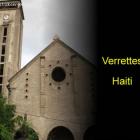ADVERTISEMENT
Francois Duvalier - Haiti Observer Blog
Francois Duvalier, Haiti Observer Blog. Read the following articles about Francois Duvalier
Madame max Aldolphe
Francois Duvalier, the 40th President of Haiti, had a number of people who he used during his regime to impose his rules and methods of running his own government. A rule of guns, military power along with personality cult and voodoo, Francois Duvalier was responsible for the death of over 30000 Haitians. This not only struck fear and horror in the hearts of the people of Haiti when he was alive, it is something that Haiti has not recovered from ever since.
One of the significant figures of Francois Duvalier's regime was Madame Max Adolphe. Every leader has a group of deputies under him/her to take care of nationalistic duties. Madame Max Adolphe was one such individual under Duvalier's reign. She was what Duvalier, during his presidency, called his "right hand".
Clement Barbot and Tontons Macoutes ("Bogeymen")
Dressed in a black suit and sporting dark sunglasses, Clement Barbot instigated fear wherever he went. Not with just his presence, the mere sound of the DKW jeep he rode on created a sense of fright among people. As the chief and controller of the National Security Volunteers, earlier called the Tonton Macoutes or the "hooded men", Clement Barbot was much more than just a force to reckon with during the Francois Duvalier regime.
When Francois Duvalier was proclaimed President for a term period of six years, Clement Barbot was then the self-proclaimed "Chief of the Secret Police". The team that was functioning under him was not just the military personnel. His team was a good mix of both military personnel and civilians. Clement Barbot, along with his Tonton Macoutes, gave people three alternatives other than silence and obedience. Those were to end up in jail, get themselves killed and flee the country. It was this reign of terror that struck fear in the hearts of people.
Aristide's Arch Enemy Gerard Pierre-Charles
Writer, economist, and firebrand Gérard Pierre-Charles was born in Jacmel in 1935. A radical, whose political beliefs were shaped by the government of Haiti's failed attempts at democracy, he co-founded a Marxist organization. In 1959, feared dictator François Duvalier caused him to flee to Mexico.
For the next quarter-century, Pierre-Charles taught economics at Mexico City University. He achieved respect as an academician and political extremist. He co-founded Haitian Unified Communist Party (HUCP) and waited for Jean-Claude Duvalier to be deposed, which happened in 1986.
Back in Haiti, he grew disenchanted with the Communist Party, and became an ally of Jean-Bertrand Aristide, who had founded Lavalas Party. Aristide was riding high on a wave of popular support, assuming the presidency in 1991. But military opposition ousted him shortly into his presidency. Pierre-Charles seized control of Lavalas and shaped it into an effective political tool, Lavalas Political Organization.
Jean-Jacques Honorat, Haiti Prime Minister
Haiti's third Prime Minister, Jean-Jacques Honorat, came to the post after the 1991 coup which deposed President Jean-Bertrand Aristide and his appointed Prime Minister, René Préval. Honorat, born on April 1, 1931 in the nation's capital, succeeded to the post under the new, provisional President, Joseph Nérette, but, like many others on the list of 17 since 1988, Honorat's stint would be short-lived and terminated after military dissatisfaction. He'd spent eight months in office before being fired after failing to garner the lifting of international sanctions put on Haiti. He also served from October of 1991 to the end of the year as Minister of Foreign Affairs and Worship.
Luc Desir, chief of Francois Duvalier's Secret Police
Few people guilty of the most heinous crimes in Haiti's history have received due punishment. It would seem that justice for the wrongs done to people in the country, blatantly orchestrated and performed by those in power, is a thing to be hoped for but never truly achieved.
When Luc Désir was charged with his crimes and sentenced to life imprisonment at hard labor in the late 1980's, it seemed as though all the people he'd tortured, their families who suffered and those whose lives he'd brutally ended, all as the head of Francois Duvalier's Secret Police, would finally see restitution. It's been speculated that hundreds of people imprisoned by him disappeared without trace, the true nature of his dealings with the imprisoned unknown until audio recordings he made of his torture sessions became public fodder.
Populist President Dumarsais Estime
Dumarsais Estime, Haiti's 33rd president, held office for four years. His presidency is notable because he was the first black leader elected after the U.S. occupation ended in 1934.
Although Estimé married a mulatto elite, his determined educated blacks were to make up the majority of his administration's political appointees. Reversing mulatto elite influence, he championed an education initiative, building schools in poverty-ridden villages and offering advanced teacher-training. This effort created a 45% rise in elementary school attendance.
Dumarsais Estime's agenda included road-construction projects, literacy programs, and improving community services. He also amended the Constitution to provide workers the right to form unions and raised the minimum wage.
Jean Dominique and the Duvalier Era
It is always thought wiser to teach a man to fish than to hand him one. This is a sentiment that Jean Dominique shaped his career around upon returning to Haiti from private school in France. Working with the poor, he took his training in agronomy to teach the peasantry how to sustain themselves through skillful use of the land.
Because of his efforts, which included showing peasant farmers how to avoid being in debt to wealthy landowners, Dominique was imprisoned for six months due to the connivance of the landowners who convinced the authorities to jail him so they could hold on to their control over the peasants. Upon his release from jail, he became a fierce detractor of François 'Papa Doc' Duvalier and his militant regime.
Francois Duvalier's Violations of the 1957 Constitution
François Duvalier, Haiti's 40th President, raised in a prosperous family and well-educated, obtained his medical degree from the University of Haiti. He was a compassionate public-health official, who brought relief to Haitians suffering outbreaks of tropical illnesses. This earned him the name Papa Doc. He retained it forever, using it as a tool of manipulation.
After Duvalier returned from exile (due to a coup of a political ally), he ran on a populist platform for the presidency. Supported by the Haitian Army, he attacked mulatto elites, aligning himself with black nationals. He won the election against Déjoie, a mulatto real-estate tycoon.
The Wedding of Jean Claude Duvalier and Michele Bennett
It was revealed that the two met in High school. However, the romantic relationship between Michele Bennett and Jean Claude Duvalier did not begin until ten years later. the wedding that was considered the biggest event of the time took place on May 27, 1980. The wedding was estimated to cost over US$3 million. The marriage also brought an underlining issue to the surface in the Haitian society. Many saw it as renewed symbol of alliance with the mulatto elite by the Duvalier regime. This was in direct contrast to the policy of Francois Duvalier who in 1957 was fighting against presidential candidate Louis Dejoie, a mulatto land-owner and industrialist from the north of Haiti. Francois Duvalier used used a Noiriste strategy to challenge the mulatto elite and appealed to the Afro-Haitian majority.
Following the wedding and the increased power gained by Michele Bennett as the new First Lady, new friction started to flair-up between her and her mother in law, Simone Duvalier.
Marie-Denise Duvalier
The oldest daughter of Francois Duvalier and Simone Ovide Duvalier, also sister of former Haitian Dictator, Jean-Claude Duvalier, Marie-Denise Duvalier has not been a popular figure. She has lived a quiet and very private life with her family.
I was reported that in April 1971, following the deat of her father Francois Duvalier, Marie-Denise Duvalier was one of the candidates who could have been the successor. Jean-Claude Duvalier fought hard not to become president. Instead, he made his preference known at the time that the presidency go to his older sister Marie-Denise Duvalier. This however did not fly well with the committee which his father's Interior Minister, Luckner Cambronne, was heading.
Our objective is to share with you news and information about Haiti and the people of Haiti. Traditions, habits and the way we were or grew are alive in this site. We highly recommend that you Subscribe to our Newsletter and also share with us some of the things that are memorable and made us unique people.

 Haitian Creole Translation
Haitian Creole Translation  Verrettes, Haiti
Verrettes, Haiti  Black Friday Shopping Season
Black Friday Shopping Season  Newsletter
Newsletter  Informative Marketing and Advertising in the Haitian Community
Informative Marketing and Advertising in the Haitian Community